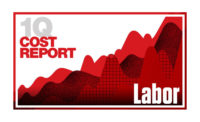Uncertainties of the COVID-19 pandemic were reflected in staff compensation during 2020, especially at the executive level, where many employers made adjustments to both base salaries and bonuses. However, unlike in past financial downturns, the pandemic appears to have had a relatively short-term impact on staffing and compensation.
As a result, observers see most contractors getting levels back on track in 2021.
During the first three months of the pandemic, some companies froze or even cut pay for executives, says Jeff Robinson, president of industry compensation research firm PAS Inc. According to its survey, 9% of respondents had reduced executive pay by an average of 20%. In the third quarter, another 6% of survey respondents reported cuts, averaging 18%.
By the end of the year, however, most employers bumped salaries back up to “make executives whole again,” he says. “There was a knee-jerk reaction when the pandemic hit,” Robinson adds. “We saw executive pay cut immediately, but within three months, some were already giving it back. They really loosened up by the end of the year.”
Robinson says that by the time lockdowns started last March, many firms had already awarded 2020 salary hikes. As a result, by year end, only 20% of PAS respondents reported not giving an increase in 2020. Across all sectors, companies that offered a bump in base pay gave an average hike of 3.8%, down from 4.2% in 2019.
After an uncertain 2020, Robinson expects more stability in 2021, although increases will remain relatively conservative. He does not expect raises to return to pre-pandemic levels, when they averaged more than 4% for three consecutive years. While employers predict a 3.4% increase this year, Robinson expects the average will be closer to 3.7%—essentially flat compared to 2020.
|
Click here for Full |
Sector Differences
Last year, electrical contractors were at the high end of increases, offering 4.3% raises. By comparison, specialty contractors other than electrical and mechanical averaged 3.5%. Based on type of work, firms in the industrial sector offered the largest increase, 4%, while those in heavy civil gave the lowest, 3.6%. Heavy civil firms awarded 4.6% hikes to executives in 2019, the highest in the PAS survey.
Daniel Pauletich, senior managing director at executive search firm Specialty Consultants, sees a lot of variation in demand for executive talent, depending on location and market sector. “The demand we’re seeing is largely in the multifamily sector,” he says. “In terms of geography, when I talk to folks in New York City, there’s an undertone of pessimism. When I talk to folks in Florida and parts of Texas, there’s robust optimism. It’s almost as if COVID didn’t exist.”
Bouncing Bonuses
Still, executive compensation offers for candidates have stayed fairly flat, Pauletich says. “If a company was offering $250,000 twelve months ago, it is targeting that same salary now.” But executive bonuses took a hit for many since they are generally tied to company profits. “There’s so much uncertainty about whether projects will move ahead, it’s caused a pause,” he says. “Many executives accepted a bonus that’s 25% or 50% less than target.” Pauletich adds that many firms pushed bonuses to be paid in mid-2021 instead of at the end of last year.
Jeff Wittenberg, managing director at search firm Kaye/Bassman, has also seen mixed demand for executive talent. While firms in multifamily and light industrial sectors are in greatest need, those in retail and hospitality “took it on the chin and are cutting everything they can,” he says.
Some execs at struggling firms might be willing to move, but Wittenberg says companies want talent with experience in specific sectors.
“If you’re a light industrial company and you’re scaling up, you might need talent at all levels, but you won’t bring in a VP or above who has done nothing but hotels,” he points out. “Firms have a healthy appetite, but they can’t find enough of the right people. That’s where you’re seeing compensation really rise.”





Post a comment to this article
Report Abusive Comment